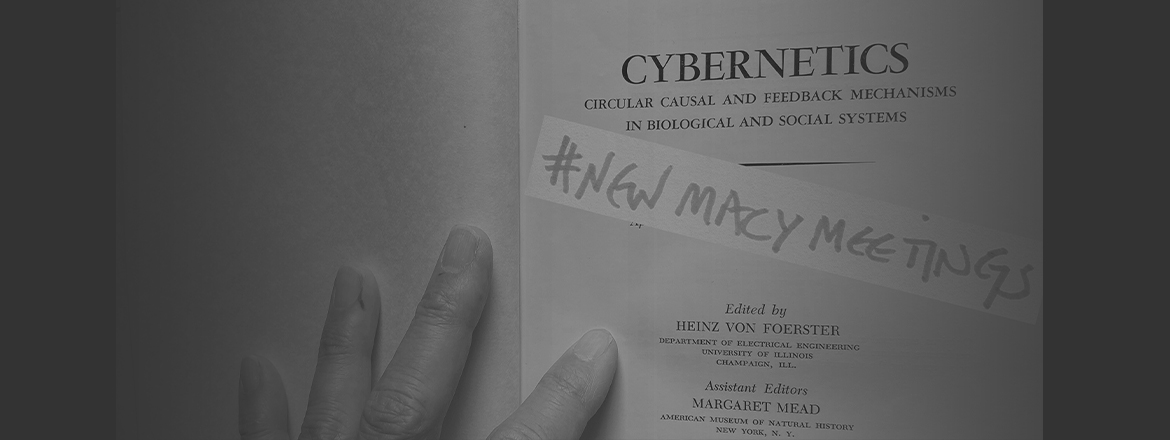

KEYNOTE
Margaret Mead once wrote that she felt compelled to recommend, during an organizational meeting in the 1950s for what became the ISSS, that this nascent society turn the precepts of its field upon itself. She was, in her own words, “slapped down without mercy.” I’m no Margaret Mead but I know an opportunity for Systems and Cybernetics when I see one — wait, make that many more opportunities than just one.
There are many pandemics of today’s world: population and climate, food and water, poverty and healthcare, inequality and racism, disinformation and artificial intelligence. Any pandemic is a systemic calamity; this entanglement of pandemics, so much more so. Responses without cyber-systemic viewpoints and practices will certainly fail. Knowing what we know, how can we stand by? If we don’t respond, then who will? This is not arrogance; this is responsibility.
Where to begin: we have precepts from the 20th-century origins of Systems and Cybernetics. These are numerous and powerful and ready for use in our current context of 21st-century pandemics. No short list of precepts is adequate but these are the most relevant to my argument today: understanding systems in terms of purpose; prioritizing human intention above techno-efficiency; designing collaborations for variety; seeing our own seeing and the responsibility that entails.
Now consider contrasts and opportunities from Margaret’s exquisite invitation to apply our precepts to ourselves: her context was a single organization; WOSC is an organization of organizations (an entanglement of organizations?). We must compare and contrast our individual organizational strengths and variety, in order to coordinate our planning effectively. The mission statements of WOSC’s member societies propose activities to purvey the theories and methods of Systems and Cybernetics. But they need revision (and here I risk the same reaction that Margaret received): more than just evolving and purveying our knowledge, we must prioritize action. Of course, conversation is key, as it must precede agreement, which must precede coordinated action (this wrongly implies that all proceeds from talk; in practice, very soon the loops take over). But our conversations must become louder and our collaborations more urgent and more insistent, because pandemics won’t wait. To do less is to neglect our responsibilities.
Beyond just greater attention to our field, we must prove how our theories and practices lead to action that will bring enduring, positive change.This requires a transdisciplinary effort with the ambition of the original Macy Meetings, now revived and revised for the 21st-century entanglement of pandemics. With the American Society for Cybernetics as a seeding participant, an initiative to create a #NewMacy Network for transdisciplinary, transglobal, and transgenerational conversations for action has begun. You are invited to join.
Even after Margaret was slapped down, she didn’t hesitate to return to her elegant question. She posed it again in the 1960s at the first conference of the American Society for Cybernetics: “What in thunder are we founding” if we don’t apply our own precepts to what we are doing? I am asking this of all of us here at WOSC in our pandemic world. Slap it down if you like. But Margaret’s provocation, and the responsibility we have, won’t go away.
DownloadPosition Paper on #NewMacy: Responding to the Pandemic of "Today's AI"
DownloadPPDF of #NewMacy-related Appendices
DownloadCybernetics and the AI Crisis: A Bilingual Synthesis
DownloadAndrew Pickering's call for "Next Macy Meetings"
DownloadCybernetics and Design: Conversations for Action, co-authored with Hugh Dubberly
DownloadBlog Post on #NewMacyMeetings
DownloadLess Interference, More Dance!: Interpreting Gordon Pask, Toronto 2019
DownloadLinks about Designing for Conversation
ViewRSD5 Video: Designing Conversations for Scocially-Conscious Design
Paul Pangaro is President of the American Society for Cybernetics and Professor of the Practice in the Human-Computer Interaction Institute at Carnegie Mellon University. A current project is an initiative called #NewMacy that will revive and revise the original Macy Meetings for the challenges of the 21st century. His career spans startups, consulting, research, and education. He has worked with and within startups in New York and Silicon Valley, in product and technology roles. His most recent startup was General Cybernetics, dedicated to new ways of reading and writing in digital media based on Gordon Pask’s Conversation Theory. Past consulting clients have include Du Pont, Nokia, Samsung, Instituto Itaú Cultural (São Paulo), Ogilvy & Mather, Intellectual Ventures, and PoetryFoundation.org. He has lectured in São Paulo, Paris, Berlin, Vienna, Linz, and in cities in the US, most often on design for conversation and conversations for design. Partnering with TJ McLeish as master fabricator, they created a full-scale replica of Pask’s Colloquy of Mobiles, displayed at Centre Pompidou in Paris in 2020 and now part of the permanent collection at ZKM in Germany. Pangaro studied theatre, film criticism, and computer science while earning a B.S. at MIT, spending the rest of his time acting in plays and writing software for interactive graphics and computer-generated film. On graduating Pangaro worked on neural simulations with Jerry Lettvin and then joined the research staff of the MIT Architecture Machine Group (which later morphed into the MIT Media Lab) where he met Gordon Pask and consequently completed his PhD with Pask at Brunel University (UK). His work can be found at http://pangaro.com/. http://pangaro.com/.